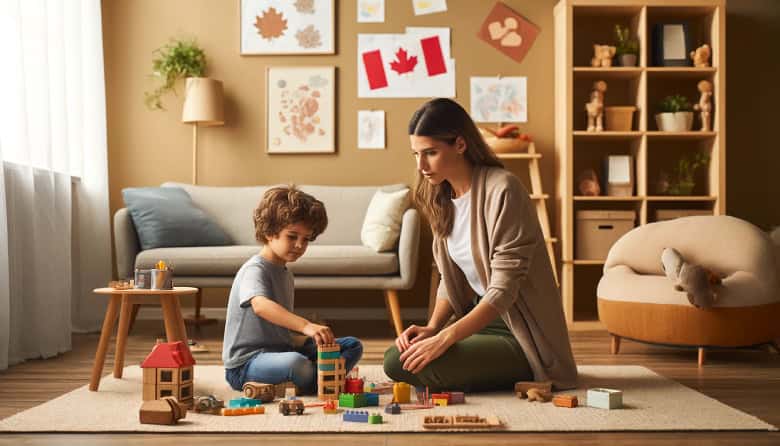
I’m Gloria Segovia, the founder of AERCS. I’m delighted to introduce you to our nurturing approach to child development – Play Therapy. In this therapeutic setting, your children are given the freedom to express themselves – and navigate their emotions through play. Whether your child is dealing with emotional upheavals, social challenges, or simply needs a supportive environment to flourish, I want you to know: you’re not alone.
TL;DR Key Takeaways.
- Play Therapy is a method for children to express and navigate emotions through play, useful for emotional upheavals and social challenges.
- Benefits: Includes emotional resilience, enhanced communication, problem-solving, social skills development, self-esteem boost, stress reduction, and behavioral improvement.
- Signs Your Child Might Need Play Therapy: Behavioral changes, emotional outbursts, withdrawal, sleep disturbances, and regression in development are indicators.
- How It Works: Describes the play therapy process at AERCS, including types of activities like creative arts, role-playing, and sensory play.
- Choosing the Right Time for Therapy: Discusses assessing readiness and the importance of timing in starting therapy.
Listen to the audio clip discussing this post…
When to Consider Play Therapy?
If you’re wondering about the emotional hurdles your child might be facing and how you can help, play therapy may be an option for you. Play therapy is a gentle yet effective approach to help kids navigate their feelings and challenges.
When to Consider Play Therapy? Well, it’s ideal if your child seems overwhelmed by emotions or struggles with behavior that’s hard to manage. This therapy offers a creative and expressive outlet for them to explore their emotions safely and constructively.
Understanding Play Therapy and Its Benefits.
Hey there! Let’s unpack play therapy, a fantastic approach for children facing emotional and behavioral challenges. Imagine it as a toolbox; each tool, or play activity, helps children express themselves in ways words just can’t reach.
Why Play Therapy? It’s like magic for kids who find the world a bit too tough. They can explore feelings, experiment with different outcomes, and learn new ways to cope with challenges.
Key Benefits of Play Therapy:
- Emotional Resilience: Kids learn to face ups and downs more effectively. Think of it as emotional gymnastics, each session helps them become stronger and more flexible emotionally.
- Enhanced Communication Skills: As they play, children learn to put their thoughts and feelings into words, helping them communicate better with everyone around them.
- Problem-Solving Skills: Engaging in play allows children to work through problems and find solutions. It helps boost their critical thinking and creativity.
- Social Skills Development: Play therapy often involves group settings where children can interact, share, and play together, which enhances their social abilities and helps them understand others’ perspectives.
- Self-Esteem Boost: As children express themselves and are validated through play, they often feel more confident and valued.
- Stress Reduction: Play provides a natural way for children to relieve stress, as it’s both engaging and diverting, offering them a break from their worries.
- Behavioural Improvement: Regular play therapy sessions can lead to better behavior at home and in school, as children learn more effective ways to express their emotions and needs.
I’ve seen firsthand how transformative play therapy can be. One young child, let’s call him Jamie (real name with-held for privacy), struggled with big feelings after his parents divorced. Through play, he learned to express his anger and sadness in a safe space, gradually finding his way back to laughter and joy.

Signs Your Child Might Need Play Therapy.
Wondering if play therapy is right for your kiddo? Here are some signs that might point towards yes. Each child is unique, but certain behaviors can indicate they could benefit from this therapeutic approach.
Common Signs to Watch For:
- Changes in Behaviour: If your child suddenly starts acting out or shows drastic changes in their usual behavior, it might be a cue.
- Emotional Outbursts: Frequent tantrums or intense reactions to small problems could be signs they’re struggling to process their emotions.
- Withdrawal: On the flip side, if your child becomes unusually quiet or retreats from social interactions, they might be overwhelmed internally.
- Sleep Disturbances: Trouble sleeping or nightmares can also be an indicator of unresolved emotional issues.
- Regression in Development: If they start to revert to behaviors typical of a younger age, like bedwetting or clinging, it’s worth considering.
Real-Life Example:
Let me tell you about a kid just outside of Toronto, Mike (not his real name, name with-held for privacy). Mike started school this year and began to throw tantrums almost every morning before school. His parents were puzzled because he was usually such a spirited and happy kid. After some observation and a chat with a counsellor, they tried play therapy. It turned out, Max was feeling really anxious about school and didn’t know how to express it. Play therapy gave him the tools to communicate his fears.
So, if these signs ring a bell for your child, it might be time to explore play therapy as a supportive pathway. It’s not just playing; it’s a way for them to express and understand their emotions, which is pretty cool, right?
How Play Therapy Works at AERCS.
Curious about how play therapy can make a difference for your child? Let’s break down how it works at AERCS, keeping it simple and easy to grasp.
The Play Therapy Process:
AERCS Play therapy sessions are carefully designed to meet the unique needs of each child. Here’s a general idea of what happens:
- Initial Consultation: It starts with a chat – parents discuss their child’s needs and behaviours with a therapist to tailor the approach.
- Therapeutic Play Sessions: These are the heart of play therapy where kids engage in play activities under the guidance of a trained therapist.
- Ongoing Assessment: Throughout the therapy, the therapist observes and adjusts the activities to best support the child’s emotional and developmental progress.
Types of Activities in Play Therapy:
- Creative Arts: Drawing, painting, and crafting that allow children to express feelings they might not be able to verbalize.
- Role-Playing: Kids act out different scenarios which help them process real-life events and emotions in a safe environment.
- Storytelling: Using stories to help children understand and manage their feelings and behaviors.
- Sensory Play: Activities like playing with sand or clay that engage the senses, which can be particularly calming and grounding.
Each of these activities is chosen to foster emotional expression and aid in development. They’re not just play; they’re a form of communication and growth. So, if your little one is showing signs that they might benefit from this type of therapy, why not give it a shot? It could be a game-changer in helping your kids express and understand their emotions.
Choosing the Right Time for Play Therapy.
Hey there! Deciding when to start play therapy for your child can feel like a big step. Here’s some of my straightforward advice on picking the right moment, to ensure it aligns with your child’s emotional readiness and overall needs.
Assessing Your Child’s Readiness:
- Observation: Keep an eye on how your child manages emotions and stress. Signs of struggle might indicate it’s time to consider therapeutic options.
- Consultation: Don’t hesitate to consult with a professional. We can help with valuable insights into whether your child may benefit from play therapy.
Working with Professionals:
- Initial Meetings: These discussions with therapists are not just about assessment but also about building a trusting relationship that can support your child’s therapy journey.
- Follow-ups: Regular updates and feedback sessions will help you and the therapist gauge the progress and adjust the approach as needed.
Choosing the right time for therapy isn’t about finding a perfect moment; it’s about making an informed decision when you see your child needing support to navigate their world better. If you’re noticing signs that challenge their ability to cope, it might be the right time to explore play therapy.
Did You Know...
There is substantial research supporting the effectiveness of play therapy in various contexts.
Play Therapy International (based in the UK) highlights that play therapy has shown a 77% positive change in children’s emotional and behavioral issues, with 61% being clinically significant improvements. This indicates that play therapy is highly effective in addressing emotional, behavior, and mental health problems in children.
Success Stories of Play Therapy.
Let’s take a moment to celebrate some incredible transformations witnessed through play therapy right here in the Greater Toronto Area. Here are four anonymized stories that showcase the positive impacts of play therapy:
Ella’s Journey:
Background: Struggled with social anxiety and fear of school.
Outcome: Through role-playing games, Ella became more confident and began initiating playdates with classmates.
Liam’s Progress:
Background: Exhibited aggressive behavior and frequent tantrums.
Outcome: Sensory play helped Liam express his frustrations constructively, leading to calmer responses at home and in kindergarten.
Ava’s Transformation:
Background: Faced challenges with emotional regulation after her parents’ separation.
Outcome: Art therapy sessions enabled Ava to illustrate her feelings, significantly improving her mood and emotional awareness.
Noah’s Breakthrough:
Background: Showed signs of withdrawal and disinterest in previously enjoyed activities.
Outcome: Through storytelling and puppet play, Noah re-engaged with his peers and regained his enthusiasm for daily activities.
Sophie’s Breakthrough:
Background: Had difficulty adjusting after moving to a new city, showing signs of loneliness and sadness.
Outcome: Interactive group play sessions encouraged Sophie to connect with new friends and express her feelings about moving. She now feels more at home and excited about her new surroundings.
How to Find and Choose a Play Therapist in Ontario
Hey there! Choosing the right play therapist for your child is a big decision. Here’s a practical guide on how to find a qualified therapist in the Greater Toronto Area (GTA), focusing on their credentials, approach, and compatibility with your child. Also, I’ll share how AERCS aligns with these important criteria.
Tips for Choosing a Play Therapist:
- Check Credentials: Ensure the therapist has proper certification and training in play therapy.
- Evaluate Their Approach: Different therapists have different methods. Make sure their approach aligns with your child’s needs.
- Consider Compatibility: It’s crucial that your child feels comfortable with the therapist. A good rapport can make a big difference.
- Ask for Referrals: Speak with other parents or professionals who can recommend trusted therapists.
- Initial Consultation: Most therapists offer a first meeting to discuss your concerns and their approach. Use this to gauge how they interact with your child.
Why Choose AERCS Therapy?
At AERCS, we meet all these criteria with highly qualified therapists skilled in various play therapy techniques. Our therapists are committed to creating a supportive and effective environment for every child.
5 Point Checklist for Choosing a Play Therapist:
- Certified in play therapy.
- Uses an approach that suits your child.
- Creates a rapport with your child.
- Recommended by trusted sources.
- Offers an informative initial consultation.
Using this checklist can help streamline your decision-making process, ensuring you find the best possible support for your child here in Ontario.
Final Thoughts About Play Therapy.
Alright, so here we are at the end of our chat about play therapy. It’s crucial to keep an eye on those little signs your child might show you know, those moments when they consistently seem a bit off or not quite themselves. Play therapy could be just the thing to help them get back on track, because it’s about giving them a safe space to express themselves and sort through whatever is bugging them.
If what we’ve talked about strikes a chord with you, or if you’re just curious to learn more, why not check out AERCS Play Therapy? Booking a consultation could be the first step toward a big positive change in your kid’s life.
FAQ.
What is play therapy?
Play therapy is a therapeutic approach primarily used with children to help them express their emotions, resolve conflicts, and learn coping strategies through structured play activities. It’s particularly beneficial for children struggling to articulate their feelings verbally.
How do I know if my child needs play therapy?
Consider play therapy if your child shows signs of emotional distress, behavioral changes, or struggles with social interaction. Signs may include increased tantrums, withdrawal from friends or family, or regression in developmental milestones.
What are the benefits of play therapy for children?
Play therapy can enhance emotional resilience, improve communication skills, foster problem-solving abilities, boost self-esteem, and reduce anxiety and stress. It helps children learn to express their emotions in a healthy way.
How long does play therapy take to show results?
The duration of play therapy depends on the child’s individual needs and the specific issues being addressed. Some children may show noticeable improvements in a few sessions, while others might need longer to benefit fully from therapy.
Can play therapy help with specific disorders like ADHD or autism?
Yes, play therapy can be particularly effective for children with ADHD, autism, and other developmental disorders as it helps improve attention, regulate emotions, and enhance social skills in a structured yet flexible environment.
Does Your Child Need Play Therapy?
Take this quick quiz to see if play therapy at AERCS could benefit your child!
Is your child facing emotional or behavioral challenges?
Discover how Play Therapy at AERCS can help your child express, understand, and manage their feelings in a safe and nurturing environment. It’s more than just play?it’s a path to healing. Don’t wait to give your child the support they need.
Learn more about our Play Therapy services and how we can help your child thrive.











